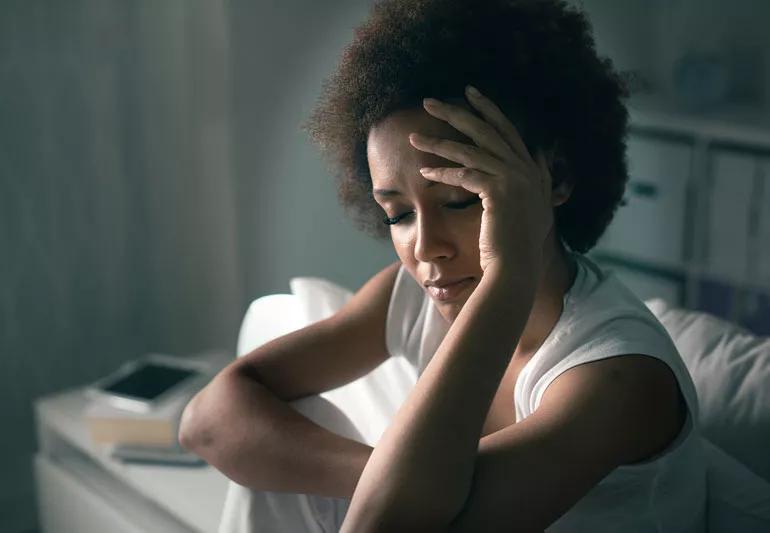Therapy helps pain sufferers get their sleep

Image content: This image is available to view online.
View image online (https://assets.clevelandclinic.org/transform/a1fcc42a-0efd-4ec8-b366-b71d5126c236/insomniaPain-901220642-770x533-1_jpg)
woman in pain with insomnia in bed
Ah, elusive sleep. Insomnia. Many of us have been there. For people with chronic pain — whether from back pain, fibromyalgia or the pain of cancer treatment — sleep issues are especially common, and pain is one of the most common causes of insomnia. Up to 2/3 of patients with chronic pain conditions also experience sleep disorders.
Advertisement
Cleveland Clinic is a non-profit academic medical center. Advertising on our site helps support our mission. We do not endorse non-Cleveland Clinic products or services. Policy
“Pain worsens sleep patterns and sleep disturbances worsen pain. It’s a vicious cycle,” says pain specialist Robert Bolash, MD. These problems can range from difficulty falling asleep to difficulty staying asleep. And without good sleep, this can lead to heightened pain and worsening sleep.
Treating insomnia can help your chronic pain subside. But before treating insomnia, it’s important to rule out other issues that could be causing your sleep struggles, says sleep specialist Michelle Drerup, PsyD.
“Sometimes, after receiving a new diagnosis, it’s common for people to struggle with other disorders that can affect sleep, like depression or post-traumatic stress disorder,” she says.
If you struggle with insomnia, it can also be caused by a sleep-related medical condition, like sleep apnea. When your sleep quality is poor, your pain levels are exacerbated. “At times, we see patients with pain diagnoses who really have a medical condition such as sleep apnea. When their sleep apnea is treated, their pain diminishes as well,” Dr. Bolash explains.
Those are the simple cases. But more often, treating pain and insomnia requires a team approach with help from different medical specialists. “We know that certain pain medications can improve sleep, and we prescribe these for those who have both a sleep disorder and a specific pain disorder,” says Dr. Bolash. “However, we must use caution with opioid pain medications, which can disrupt sleep and prevent patients from entering deep sleep after as little as one dose,” Dr. Bolash says. Opioids can also cause sleep-related breathing disturbances.
Advertisement
He adds that once easily reversible causes — from drinking too much caffeine to using opioids — are stopped, behavioral therapy is often the next treatment of choice.
To understand how chronic pain might make it difficult to fall asleep, it is helpful to think about your bedtime routine. Most people will eliminate distractions in order to relax and fall asleep, including things such as turning off lights, making it quiet and getting comfortable.
“But this quiet environment can actually cause problems if you have chronic pain,” says Dr. Drerup, “because then the only thing you have to focus on is your pain.” Unfortunately, without other distractions, pain seems to become “louder” and in many cases, the perception of pain — not necessarily the actual pain — increases when attempting to fall asleep.
Cognitive behavioral therapy for insomnia (CBT-I) includes a number of strategies designed to improve your sleep quality and help you change thoughts and behaviors that interfere with sleep. This type of therapy is often preferred over medications because it has no side effects and is a more effective long-term solution.
One of the main goals of CBT-I is to help you control or eliminate negative thoughts and worries that keep you awake. CBT-I helps you to become more aware of thoughts related to sleep. “Once controlled, those thoughts tend to decrease and it is easier for you to fall asleep,” says Dr. Drerup.
Another strategy to help with insomnia is relaxation training, which reduces or eliminates muscle tension and distracts you from racing thoughts. Techniques include specific muscle group relaxation, guided imagery and meditation.
“Regardless of the type of relaxation strategy used, the treatment involves professional guidance and teaching these skills over a number of sessions,” Dr. Drerup says. She conducts both individual and group sessions on CBT for insomnia. “Usually, patients will take part in three to eight sessions to learn these techniques and discover what works for them,” she says.
The good news is that CBT for insomnia has been proven effective with 70 to 80% of patients who seek this treatment, says Dr. Drerup.
For these strategies to work, you also need to follow good sleep hygiene. Here, Dr. Drerup offers highlights of the standard guidelines:
Advertisement

Sign up for our Health Essentials emails for expert guidance on nutrition, fitness, sleep, skin care and more.
Learn more about our editorial process.
Advertisement
Arthritis, migraines and endometriosis are common causes of chronic pain
Not all signals of physical pain actually make it to our brains — and you have some power over it
Debunking common myths so you can live your fullest life
Research shows that the pain experience differs for women and men
The Short Answer from a pain specialist
Cognitive behavioral therapy helps guide thoughts, actions
Medications, tubing and stress can steal away the ZZZs you need
Hormone changes can definitely leave you tossing and turning at night, but help is available
Type 2 diabetes isn’t inevitable with these dietary changes
Applying a hot or cold compress can help with pain
Pump up your iron intake with foods like tuna, tofu and turkey